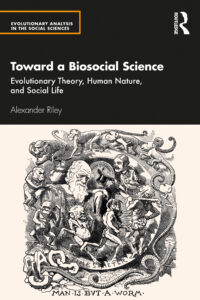Alexander Riley, Senior Fellow, The Alexander Hamilton Institute for the Study of Western Civilization (AHI), teaches sociology at Bucknell University. He has openly criticized the state of his own discipline, its politicization and declining standards. In his latest book, Toward a Biosocial Science Evolutionary Theory, Human Nature, and Social Life (Routledge 2021), he performs a deep dive into the discipline, asking at the start, “Why do we do sociology?” In answering this and other basic questions about why we want to know about ourselves and our societies, Dr. Riley has produced a tour de force. The legendary Harvard biologist Edward O. Wilson calls Riley’s study “an extraordinary book, entertaining, erudite, courageous, and a potential lifeline for sociology.”
 The first approach in attempting to justify the discipline, Dr. Riley observes, “might simply be to “declare our desire to have the most accurate information available in thinking about what is possible, how best to guide and direct our lives together to minimize strife and maximize well-being. But the desire to try to make the kind of societies we think we want or should have alone is insufficient to explain the emergence of sociology, the science of society. There is—or once was—something about the nature of the way of knowing that characterized emergent sociology that made it a particularly attractive and helpful tool for imagining what kind of creatures we are and how we should live together.”
The first approach in attempting to justify the discipline, Dr. Riley observes, “might simply be to “declare our desire to have the most accurate information available in thinking about what is possible, how best to guide and direct our lives together to minimize strife and maximize well-being. But the desire to try to make the kind of societies we think we want or should have alone is insufficient to explain the emergence of sociology, the science of society. There is—or once was—something about the nature of the way of knowing that characterized emergent sociology that made it a particularly attractive and helpful tool for imagining what kind of creatures we are and how we should live together.”
Ultimately, he argues “we want to know about the world we inhabit—which includes us and our societies—because it is our nature to pursue knowledge. And we want to know how to live, and how to live together, because it is our nature to want to live well rather than badly, to want abundant life rather than deprived, impoverished life. Science as a way of knowing emerged with that same dual focus: Learn what is the case because it is good to know, and then use that knowledge to try to make human life better because it is good to have more pleasant lives.”
At present, Dr. Riley contends, the discipline is not measuring up to the task of justifying itself. Indeed, on the whole, the discipline’s academic practitioners are failing miserably.
“One reasonably wonders what of utility contemporary sociology can offer to this project,” he asks. “It is not just that it is too misguided about the topics discussed in these pages. Its estrangement from the scientific project is now sufficient, and its commitment to the moralizing advocacy project that Christian Smith (2014) has brilliantly documented and described as the sacred project of American sociology is so entrenched that it frequently actively opposes efforts to think scientifically about humankind.”
This book, Riley admits, “comes out of a profound disillusionment, one might even say a loss of faith. In the two decades since I received my doctorate in sociology, I have come to believe that my discipline is off the rails, and dangerously, perhaps fatally so. I did not believe that twenty-five years ago, when I was happily engaged in the process of digging around in Parisian archives to gather material for a dissertation on a small slice of the discipline’s origins. Although I was worried then about the frivolous direction of much of sociology, and the disappearance of great sociologists who had influenced me and who were replaced by much lesser lights, I believed there was evidence to indicate the possibility of a renaissance, if only the message of the need to return to the sources and the original scientific impetus of the discipline were heeded by enough young scholars. Today, based on the available evidence, I think it is more likely that sociology will collapse under the dead weight of its current concerns than that it will willingly reform itself according to the blueprint of this book and the other, better books that preceded it.” In short, sociology, when judged by objective measures, he concludes, is in a state of serious decline.
Richard Machalek , Emeritus Professor of Sociology, University of Wyoming, applauds Dr. Riley for publishing “an excellent overview of developments in evolutionary biology that began in the mid-1960s. Riley provides an introduction to this exciting scientific and scholarly project that will be both accessible to readers unfamiliar with the pertinent technical literature as well as stimulating and thought provoking to sociologists who are already actively engaged in the ‘second Darwinian Revolution.’ Insisting that sociological analysis must be guided by the discipline of reason and evidence, Riley encourages his peer sociologists not to allow ideological and political commitments to compromise their efforts to conduct dispassionate scientific analyses. Only then can they pursue their craft in a manner that will contribute to the development of a twenty-first century social science that can fulfill the explanatory promise envisioned by its founders.”
AHI congratulates Dr. Riley on his impressive achievement.

Leave A Comment